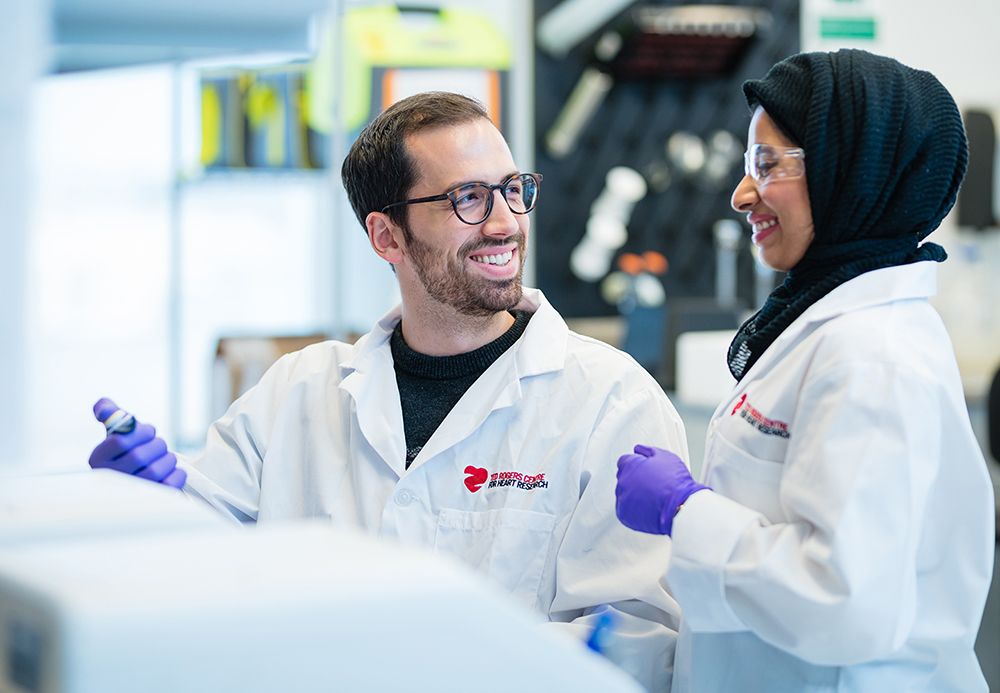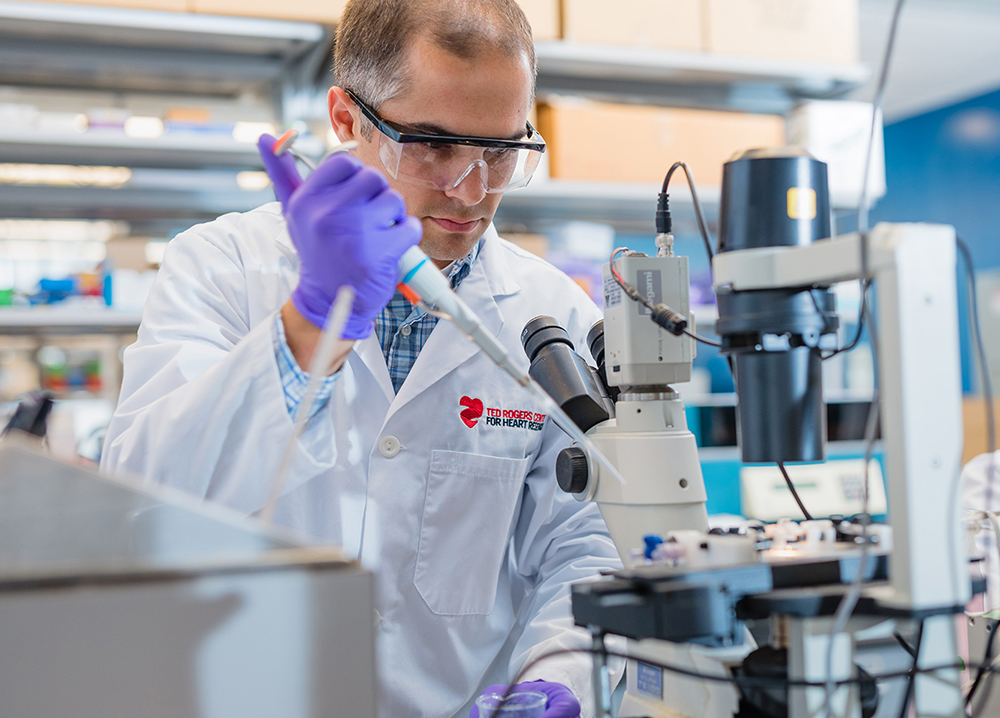Katie Shea was just 41 when she was diagnosed with a genetic type of heart muscle disease that is a common cause of heart failure. She had been feeling exhausted but at the time had chalked it up to caring for her three young children.
The implications of her diagnosis – dilated cardiomyopathy – were frightening: it was unclear how long she would be able to live with the condition. She would need to go on daily medications and have a defibrillator implanted.
“I painfully struggled with the fact that no matter what I did, no matter how hard I worked, this was never going away,” she wrote in a blog post following her diagnosis. “I grieved the loss of the old me. … I wondered how the new me was going to raise my children while I adjusted to treatment.”
That day, Shea joined one million other Canadians who have experienced various forms of heart failure. The news was devastating, but she was thankful to receive cutting-edge care and participate in the groundbreaking genetic research of scientists and clinicians at the Ted Rogers Centre for Heart Research.
Expanding capabilities
These efforts received a major boost last October when the Rogers Foundation announced a $90-million donation – matched with $94.2 million in institutional support and additional fundraising – that will significantly expand the centre’s capabilities.
The new gift comes on top of a record $130-million donation the foundation made in 2014 to establish the centre, a collaboration that harnesses the strengths of its three institutional partners – the Hospital for Sick Children, University Health Network (UHN) and U of T – to reduce the impact of heart failure in Canada.1

Researchers at the centre are using artificial intelligence to analyze complex patient data and predict and prevent heart failure. They are building on genetic and biomarker research to reveal the underlying mechanisms of heart failure and to identify new treatments. The centre will also expand genomics-based diagnosis for heart failure, including identification of the genetic causes of cardiomyopathy and congenital heart disease.
After her diagnosis, Shea had her own children screened with echocardiograms and electrocardiograms at SickKids. “Thankfully, all results came back noting normal cardiac function,” she says.
Cutting hospitalizations in half
One of the centre’s biggest achievements in its first decade has been to cut rehospitalizations for heart failure at UHN in half, says Dr. Mansoor Husain, the centre’s executive director. He hopes the new funding will help prevent hospitalizations for heart failure on a global scale.
This will involve the enhancement of the centre’s Digital Health Platform, which enables the rapid assessment and triaging of patients in real time with wearable devices, sensor-based technologies and AI. This platform will expand across Canada and internationally, beginning with underserved communities, as well as children and youth.
The gift will also help train the next generation of leaders in cardiac care.




2 Responses to “ Rogers Foundation Gives $90 Million to Usher in New Era in Cardiac Care ”
On the face of it, the new technologies discussed in this article appear impressive. But this sentence troubles me: “They are building on genetic and biomarker research to reveal the underlying mechanisms of heart failure and to identify new treatments.”
Is anyone still interested in the nutritional origins of disease? Is anyone being screened for omega-3 fatty acid deficiencies, magnesium, vitamin C or elevated insulin? There is a lot of research on how these are connected to heart health.
Does a visit to a primary physician or cardiologist include a comprehensive review of dietary and lifestyle practices? Or is it more financially lucrative to look at treatments and sexy tech wearables?
I think the University of Toronto should take a leadership role and mandate the medical curriculum to include a genuine focus on nutrition and lifestyle. There are many benefits of modern medicine, but these need to be used judiciously and wisely.
@Farida
Thank you for your feedback on our story about cardiac research at the Ted Rogers Centre for Heart Research, and for your comments on the nutritional origins of disease.
The undergraduate medical curriculum at the University of Toronto includes a focus on nutrition and lifestyle medicine. Medical students learn about nutrition in a week devoted to health promotion, which includes content on exercise and health-behaviour change. Students also participate in a ‘culinary medicine’ workshop, which includes a kitchen scavenger hunt, budget and meal planning lecture, and virtual cooking class. Self-learning modules on nutrition supplement content on diabetes and other disorders, throughout the curriculum.
For physicians and health professionals, U of T runs the Food as Medicine Update, a symposium on established and emerging nutrition research with relevance for clinical practice. And recently, the university launched the Child Nutrition Digital Series, a practical approach to paediatric nutrition for physicians and health-care providers. Both these initiatives are accredited by national Canadian, U.S. and European physician organizations.
In terms of basic research, the Ted Rogers Centre supports studies on several factors that contribute to cardiomyopathy and affect heart health. These include genetics, thought to play a large role in hereditary cardiomyopathy, but also co-morbidities, inflammation, and molecular and cellular factors. Researchers at the centre also work with stem cells, biomaterials and monitoring technologies, some which hold promise for eradication and prevention of heart disease, but also better lifestyle management.